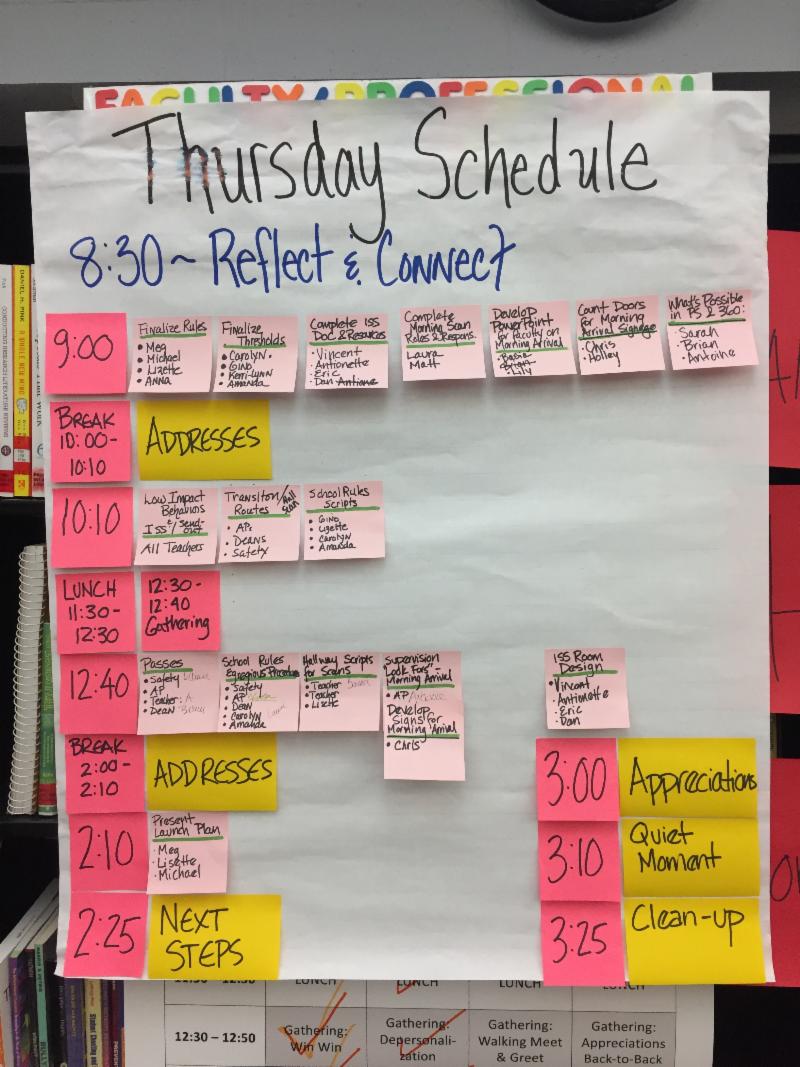|
|
|
January 15, 2019 - In This Issue:
|
|
|
|
|
We hope 2019 is off to a good start for you, your students, and your colleagues.
We have updates on our recent activity, some resources, and a set of reports on research we hope you will find relevant to your work.
Best wishes,
Lucy Patton
Engage! Newsletter Editor
|
|
What we've been up to - some highlights
|

We're expanding our reach by collaborating with departments of education in three states: Massachusetts, Connecticut, and Minnesota. In Massachusetts, we've facilitated two institutes for school leaders interested in
Recalibrating Schoolwide Discipline and Student Support and
Building a Restorative Culture.
During one session, an assistant superintendent commented, "Suspension is antiquated. Instead, I like to think of disciplinary incidents as times to teach and learn." More than 40 districts are participating in this state-wide Rethinking Discipline initiative, with two more institutes scheduled. We'll share news of our work with Connecticut and Minnesota soon.
We're working with the Syracuse City School District to form "lab" schools to support the district's plans to bring best practices to scale. Two sites will be demonstrating several core practices for peers from other schools. These include academic advisement, problem-solving and planning conferences, progress monitoring, mediated conflict resolution conferences, and restorative group conferences.
|
|
Additional resources from
Engaging Schools
|
We invite you to look at two of our recent blog posts:
- We Need to Grapple with Bias if We Want to Eliminate Disproportional Discipline. In the context of looking at existing beliefs that can lead to over-suspension, over-referral, and stubborn disproportionality in school discipline, we need to consider different kinds of bias, both implicit and explicit, which can get in the way of building an accountable, restorative school culture based on shared values.
- Discussing Tough Topics with Students. It can be challenging to support adolescents at times of trauma and anxiety, whether personal, local or global, in a school context. We offer some suggestions.
And finally stay tuned to hear more in the spring about our upcoming publication,
Engaged Classrooms: Supporting Academic Success for Every Adolescent.
|
|
|
SEL, Restorative Practices, Teaching and Learning
|
|
|
|
We've seen many studies lately that we thought would be of interest to you.
- A just-released comprehensive report by the Aspen Institute National Commission on Social, Emotional, and Academic Development makes a strong case for embedding social and emotional learning in all aspects of schooling. "Educating the whole learner cannot be reduced to a simple set of policies or proposals. It is, instead, a mindset that should inform the entire educational enterprise."
- Educators in Rochester NY found that prioritizing four specific strategies increased attendance at the schools they researched. Number one was creating an engaging environment. "Using restorative practices that pair high emotional support with high academic expectations, we gave students a voice, making it possible for staff to understand why school might not feel like a safe place." See the study here.
- CASEL (Collaborative for Academic, Social, and Emotional Learning) has released a report called "Respected" on the findings of a mixed-methods research study on the perspectives of more than 1,300 current and recent high school students on social and emotional learning. Students value SEL, but many find it lacking in their schools, and most recent students feel unprepared for life after high school accordingly.
- A restorative practices program implemented over two years in Pittsburgh Public Schools significantly reduced the number of days students were suspended and brought other benefits, a new RAND Corp. study shows, although results were mixed.
- "Some old ideas about learning die hard," say the authors in this article in Phi Delta Kappan. "Although we still have a long way to go...findings from cognitive psychology hold a lot of promise. [Many years of research] have revealed a number of powerful strategies for teaching and learning." The article covers four specific ones.
|
Please Support Engaging Schools!
Engaging Schools is a nonprofit organization that collaborates with middle and high school educators to create schoolwide communities of learning that integrate academics with social and emotional development. We provide professional learning and publications for instructional practice, classroom management, discipline and student support, postsecondary readiness, and advisory programs - all grounded in the values of equity, community, and democracy. The result: engaging schools where each and every student succeeds and makes positive contributions in school, work, and life.
We rely on tax-deductible donations from individuals and families to develop our programs and resources and help us reach more teachers, schools, and young people. Please support our work with a gift today. Thanks!
If you
 're an Amazon customer, you can make your purchases through AmazonSmile and designate Engaging Schools as your charitable organization of choice. Once you've chosen us, the Amazon Smile Foundation will donate 0.5% of the price from your eligible AmazonSmile purchases to us! The shopping experience is identical to using the regular Amazon site.
This link will take you directly to AmazonSmile for more information.
're an Amazon customer, you can make your purchases through AmazonSmile and designate Engaging Schools as your charitable organization of choice. Once you've chosen us, the Amazon Smile Foundation will donate 0.5% of the price from your eligible AmazonSmile purchases to us! The shopping experience is identical to using the regular Amazon site.
This link will take you directly to AmazonSmile for more information.
|
|
|
|
|